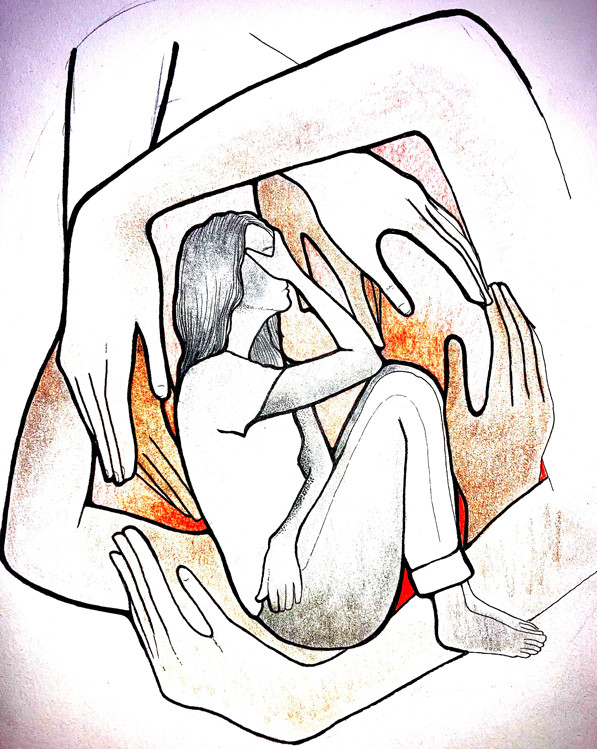All for one
Life on the Borderline

Illustration by Gabrielle Funk
A chain is only as strong as its weakest link. Or, in COVID-19 terms, a community is only safe if everyone is healthy.
In my last column, I discussed the importance of practical aspects of self-care, like safe housing and accessible healthcare. I would argue, however, that self-care isn’t complete without community care. In a culture that praises independence and looks down on neediness, it’s increasingly easy to forget about those around us when taking care of number one.
We are constantly fed curated glimpses of life through social media, where the suffering of our friends and family is written below beautiful, staged pictures and edited to fit a certain word count. We hit “like” or comment “here for you” and pat ourselves on the back before focusing inward again.
The thing is, as humans, we have evolved to rely on safe, secure social connections in order to survive and thrive. An increasing body of research shows that loneliness, a perceived lack of social connection, is associated with increased risk of mental illness, morbidity (having a disease or medical condition) and mortality (death). On the other hand, research shows that strong social ties improve health outcomes and may even prevent future illness.
More importantly, the quality of our social connections doesn’t affect just us, but our entire network. Studies show that both mental and physical health outcomes can spread widely through social communities. Happiness really is contagious, and so is COVID-19.
So, during this time when a lot is out of our hands, it’s important to focus on the things we can control. We need to return to the basics of being human and strengthen our communities, for the sake of all of us.
One really cool and easy way to help out is by participating in mutual aid. The Mutual Aid Society Winnipeg was created at the beginning of the pandemic and is doing some really incredible work. They operate using a Facebook group where people who need help can ask for it, and those who are able can help.
It really is that simple: show up for who you can, when you can, and the whole community benefits. Buy some groceries to leave on a front porch. Give your extra clothes and belongings to a family who needs them. Shovel a driveway or mow a lawn. Follow the current public-health orders. Get vaccinated.
And if someone asks you what you need, tell them. To have needs is to be human. We need to let go of the myth that being strong is doing everything on our own. True strength is being vulnerable enough to admit that we’re not okay and then doing something about it.
Things are pretty grim right now. There’s a lot we don’t know, but I can tell you one thing for certain: safe, secure attachment heals. Now, more than ever, we need to lean on each other, find strength in numbers and lift up those of us who are losing the will to keep standing.
All for one, one for all.
Hannah Magnusson is a master’s student in the arts department at Athabasca University. Her research focuses on the intersection of storytelling and advocacy, studying how fostering empathy between different perspectives can build a bridge to understanding and action. She lives on Treaty 1 territory on the shore of Lake Winnipeg.
Published in Volume 75, Number 21 of The Uniter (March 11, 2021)






